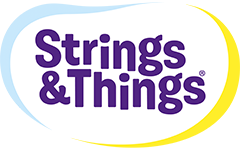FREQUENTLY ASKED QUESTIONS
What are Strings and Things Cheestrings made of?
Real cheese and that’s it! There are no artificial flavourings, no artificial colours and no artificial preservatives. There’s no gluten, either. All Cheestrings are naturally tasty and the perfect snack to add to a balanced diet.
Why are they stringy?
It’s the gentle cooking process of the cheese that allows us to create the perfect stringy-ness, which makes Cheestrings so special!
We use milk from grass-fed cows and turn it into cheese the natural way.
Then we heat the cheese before stretching it into a new shape – a long, stringy shape!
We cut the now peelable cheese into Cheestrings sized pieces – all ready for happy children to enjoy!
What is the difference between Strings and Things Cheestrings and other cheese?
There are so many types of cheese in the world – soft or hard, white or yellow, or even blue! It all depends on the milk the cheese is made from, how the cheese is made, how long it “matures” and many other factors. We like Cheestrings to be a mild cheese, as that’s what most children seem to prefer.
Why is Vitamin D important?
Vitamin D is an essential vitamin that helps our bodies absorb calcium from food and drink. It is really important for maintaining healthy bones, especially in children. Vitamin D is sometimes known as the ‘sunshine vitamin’ because the body manufactures it through the action of sunlight on the skin. Unfortunately, the sun doesn’t always shine. That’s why it is a good idea to eat foods that are rich in Vitamin D. Both Cheestrings and Yollies are a rich source of Vitamin D – one Cheestring contains 15% of the NRV* for Vitamin D.
* NRV stands for Nutrient Reference Value and is a set of European recommendations of nutritional intake based on currently available scientific knowledge. NRV replaced Recommended Daily Allowance (RDA) in 2014.
Why is calcium important?
Calcium helps keep bones and teeth healthy. It is also needed by the body to regulate muscle contractions (including the heart) and to make sure blood clots. In children, calcium is essential for building strong bones. Children aged 4 to 10 years need between 450mg and 550mg of calcium per day and 11 to 18 year olds need almost twice as much.
How can I make sure my child is eating enough calcium?
One Cheestring provides 156mg of calcium or 20% of the NRV for calcium in one go! Other calcium rich foods include all dairy food, green leafy vegetables (but not spinach), soya beans, nuts, bread made with fortified flour and fish where you eat the bones (such as sardines and pilchards). It may not surprise parents that some children don’t like some of those foods! So, Cheestrings can be a real help as a source of calcium as part of a balanced diet. Plus, they are fun to eat and taste great!
Why have we added Vitamins B6 & B12?
We’ve added Vitamins B6 & B12 for immune support. Vitamins B6, B12 & D contribute to the normal function of the immune system.
What are Yollies made from
Yollies are a dairy product. They are thickened yogurt containing all the typical ingredients found in yogurt.
How do they stay solid on the stick?
How we make Yollies is top secret, but they are simply made with all the typical ingredients found in yogurt.
Is there any cheese in Yollies?
The product is produced by the same company as Cheestrings but contain no cheese. They are thickened yogurt on a stick.
Are Yollies suitable for the lunchbox?
Yollies make an ideal lunchbox snack. As with all dairy products they should be kept in an insulated lunchbox to keep cool.
Can Yollies be frozen?
Yes, Yollies can be frozen and eaten just like an ice lolly.
Does Yollies contain artificial colours?
Yollies have no artificial colours, flavours or preservatives.
How much sugar is in one Yollie?
Each Yollie contains 2g of sugar.
How much calcium is in one Yollie?
Each Yollie contains 65mg of Calcium and 0.4mg of Vitamin D. Two Yollies provide 16% of the NRV* for Calcium and Vitamin D.
Are Yollies okay for Coeliacs?
Yes, Yollies do not contain any wheat or gluten.
Do Yollies contain gelatin?
No, Yollies do not contain any gelatin.
Why can’t you remove all plastic packaging?
Plastic packaging is the best for keeping our food safe & hygienic. It reduces food waste & is lighter than alternatives which can cut carbon emissions from transport.
Why is your packaging not already recyclable?
Recycling systems for packaging like Strings & Things are still being developed. We are reducing the amount of plastic we use, and testing packaging that is ‘designed for recyclability’ until the recycling systems are in place.
Why don’t you use recycled plastic for your packaging?
Currently, not all types of plastic are safe for food use once they have been recycled.
